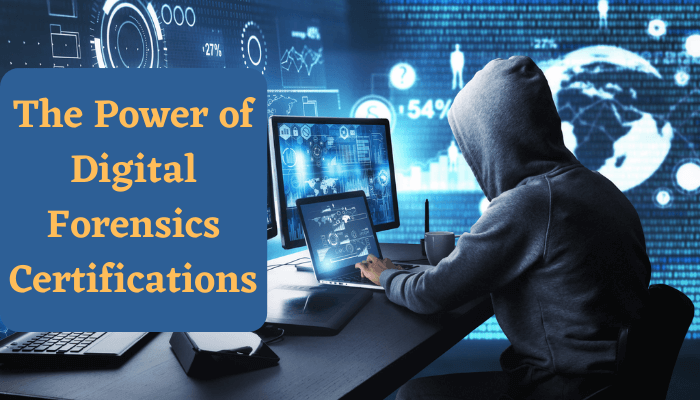As the world becomes more digital, so does the risk of cybercrimes. Cybercrimes like identity theft, hacking, and data breaches have become more prevalent in recent years. Therefore, businesses and government agencies need digital forensic experts to investigate and prevent these crimes. A digital investigation certification can set you apart from your peers and help elevate your career trajectory. This article will explain why a digital forensics certification is essential and how it can help you advance your career.
What is Digital Forensics Certification?
Digital forensics Certification is a process by which individuals can demonstrate their expertise in digital Investigation. It involves recovering, analyzing, and presenting digital evidence in legal proceedings or investigations.
A digital investigation certification typically involves passing an examination that covers various aspects of digital forensics, such as computer and mobile device analysis, network forensics, forensic procedures, and legal and ethical considerations.
Some popular digital investigation certification programs include the Certified Computer Examiner (CCE), the Certified Forensic Computer Examiner (CFCE), and the Global Information Assurance Certification Forensic Analyst (GCFA). Employers and clients recognize these certifications as evidence of an individual’s proficiency in digital forensics.
Why is Digital Investigation Certification Important?
Digital forensics certification is essential for several reasons:
Demonstrating Expertise
Expertise in computer systems, data storage, and data analysis is a fundamental requirement for the specialized field of digital investigation certification indicates that an individual has the necessary knowledge and skills to perform digital forensics work effectively and professionally.
Enhancing Credibility
Certification provides independent verification of an individual’s digital forensics skills, which can help enhance their credibility with clients, employers, and peers. Certificates can provide clients and employers with confidence in the skills and abilities of an individual, increasing their chances of being hired or assigned to complex and high-value cases.
Meeting Legal and Regulatory Requirements
Digital forensics work is often performed in legal or regulatory contexts, such as criminal investigations or civil litigation. Certification can help individuals meet the legal and regulatory requirements for performing digital forensics work and provide a clear standard for courts, attorneys, and regulatory bodies to assess an individual’s qualifications.
Advancing Career Opportunities
Certification can provide a competitive edge in the job market and may lead to better career opportunities, higher salaries, and promotions. Employers may prefer or require candidates with certification, and certification can demonstrate a commitment to professional development and continued education.
Maintaining Ethical Standards
Digital forensics professionals are often entrusted with sensitive data and must maintain ethical standards. Certification programs typically include a code of ethics that individuals must agree to abide by, providing a clear standard for ethical behavior and professional conduct.
Overall, digital investigation certification is essential for individuals and organizations involved in digital forensics work. It helps ensure quality, demonstrate expertise, meet legal and regulatory requirements, and advance career opportunities.
How to Obtain a Digital Forensics Certification
To obtain a digital forensics certification, you generally need to follow these steps
Meet the Eligibility Requirements.
Each certification program has eligibility requirements, including specific education, experience, or training in digital forensics. You should review the eligibility criteria carefully to ensure that you qualify.
Choose a Certification Program.
Many digital investigation certification programs are available, each with its focus and requirements. It would help if you researched different programs to identify the most suitable option for your needs and career aspirations.
Study for the Exam
Most certification programs require you to pass an exam to earn the certification, and you should study the exam objectives and prepare accordingly. Many certification programs offer study materials, such as textbooks, online courses, or practice exams.
Take the Exam
Once prepared, you can register for the certification exam. The exam format and length will vary by program. Some exams may be taken online, while others may require traveling to a testing center.
Maintain Your Certification
Most digital investigation certification require ongoing maintenance to remain valid. This may involve completing continuing education credits or retaking the exam after a certain number of years.
Obtaining a digital investigation certification can demonstrate your expertise and advance your career in the field. However, it is essential to carefully research the certification program and ensure that it aligns with your career goals before pursuing certification.
Conclusion
In conclusion, obtaining a digital investigation certification can be a valuable asset for professionals working in digital forensics. Certification demonstrates competency and expertise in the field and can enhance career opportunities and professional credibility. However, it is essential to choose a certification program that is recognized and respected within the industry and to keep up-to-date with the latest developments and technologies in the field. It should be noted that even though certification can offer a fundamental understanding of knowledge and skills, maintaining ongoing experience and training is indispensable for long-term success in digital investigations.






